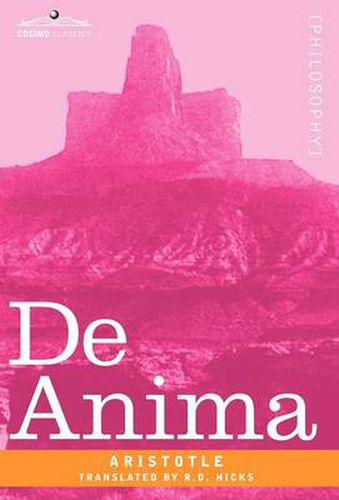Readings Newsletter
Become a Readings Member to make your shopping experience even easier.
Sign in or sign up for free!
You’re not far away from qualifying for FREE standard shipping within Australia
You’ve qualified for FREE standard shipping within Australia
The cart is loading…






This title is printed to order. This book may have been self-published. If so, we cannot guarantee the quality of the content. In the main most books will have gone through the editing process however some may not. We therefore suggest that you be aware of this before ordering this book. If in doubt check either the author or publisher’s details as we are unable to accept any returns unless they are faulty. Please contact us if you have any questions.
Knowledge, however, is an attribute of the soul, and so are perception, opinion, desire, wish, and appetency generally; animal locomotion also is produced by the soul; and likewise growth, maturity, and decay. Shall we then say that each of these belongs to the whole soul, that we think, that is, and perceive and are moved and in each of the other operations act and are acted upon with the whole soul, or that the different operations are to be assigned to different parts? -from Book I The writings of Greek philosopher ARISTOTLE (384BC-322BC)-student of Plato, teacher of Alexander the Great-are among the most influential on Western thought, and indeed upon Western civilization itself. From theology and logic to politics and even biology, there is no area of human knowledge that has not been touched by his thinking. In De Anima-which means, literally, On the Soul-the philosopher ponders the very nature of life itself. What is the essence of the lifeforce? Can we consider that plants and animals have souls? How does human intellect divide us from other animals? Is the human mind immortal? All these questions, and others that seem unanswerable, are explored in depth in this, one of the most important works ever written on such eternal questions. Students and armchair philosophers will find it a challenging-and rewarding-read.
$9.00 standard shipping within Australia
FREE standard shipping within Australia for orders over $100.00
Express & International shipping calculated at checkout
Stock availability can be subject to change without notice. We recommend calling the shop or contacting our online team to check availability of low stock items. Please see our Shopping Online page for more details.
This title is printed to order. This book may have been self-published. If so, we cannot guarantee the quality of the content. In the main most books will have gone through the editing process however some may not. We therefore suggest that you be aware of this before ordering this book. If in doubt check either the author or publisher’s details as we are unable to accept any returns unless they are faulty. Please contact us if you have any questions.
Knowledge, however, is an attribute of the soul, and so are perception, opinion, desire, wish, and appetency generally; animal locomotion also is produced by the soul; and likewise growth, maturity, and decay. Shall we then say that each of these belongs to the whole soul, that we think, that is, and perceive and are moved and in each of the other operations act and are acted upon with the whole soul, or that the different operations are to be assigned to different parts? -from Book I The writings of Greek philosopher ARISTOTLE (384BC-322BC)-student of Plato, teacher of Alexander the Great-are among the most influential on Western thought, and indeed upon Western civilization itself. From theology and logic to politics and even biology, there is no area of human knowledge that has not been touched by his thinking. In De Anima-which means, literally, On the Soul-the philosopher ponders the very nature of life itself. What is the essence of the lifeforce? Can we consider that plants and animals have souls? How does human intellect divide us from other animals? Is the human mind immortal? All these questions, and others that seem unanswerable, are explored in depth in this, one of the most important works ever written on such eternal questions. Students and armchair philosophers will find it a challenging-and rewarding-read.